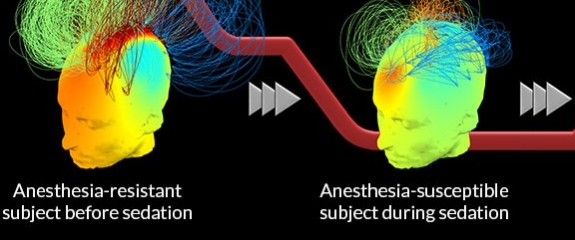Measuring brain waves may help predict a patient’s response to anesthesia

Signals in the brain can hint at whether a person undergoing anesthesia will slip under easily or fight the drug, a new study suggests. The results, published January 14 in PLOS Computational Biology, bring scientists closer to being able to tailor doses of the powerful drugs for specific patients.
Drug doses are often given with a one-size-fits-all attitude, says bioengineer and neuroscientist Patrick Purdon of Massachusetts General Hospital and Harvard Medical School. But the new study finds clear differences in people’s brain responses to similar doses of an anesthetic drug, Purdon says. “To me, that’s the key and interesting point.”
Cognitive neuroscientist Tristan Bekinschtein of the University of Cambridge and colleagues recruited 20 people to receive low doses of the general anesthetic propofol. The low dose wasn’t designed to knock people out, but to instead dial down their consciousness until they teetered on the edge of awareness – a point between being awake and alert and being drowsy and nonresponsive.
Signals in the brain can hint at whether a person undergoing anesthesia will slip under easily or fight the drug, a new study suggests. The results, published January 14 in PLOS Computational Biology, bring scientists closer to being able to tailor doses of the powerful drugs for specific patients.
Drug doses are often given with a one-size-fits-all attitude, says bioengineer and neuroscientist Patrick Purdon of Massachusetts General Hospital and Harvard Medical School. But the new study finds clear differences in people’s brain responses to similar doses of an anesthetic drug, Purdon says. “To me, that’s the key and interesting point.”
Cognitive neuroscientist Tristan Bekinschtein of the University of Cambridge and colleagues recruited 20 people to receive low doses of the general anesthetic propofol. The low dose wasn’t designed to knock people out, but to instead dial down their consciousness until they teetered on the edge of awareness – a point between being awake and alert and being drowsy and nonresponsive.


